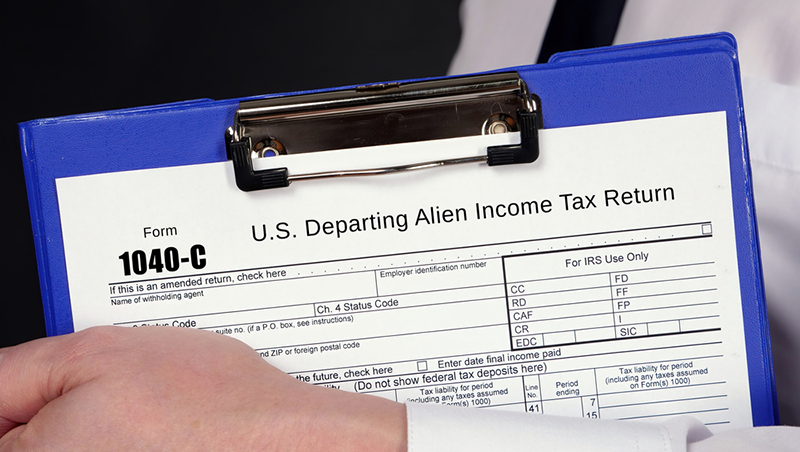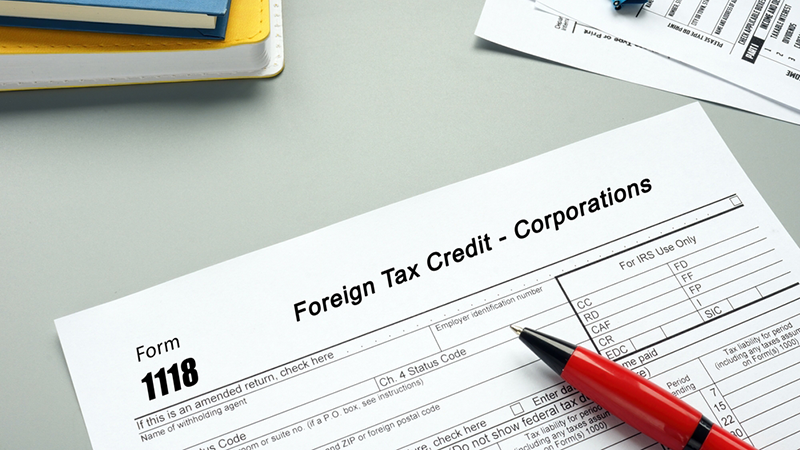Form 926 - U.S. Persons Transferring Property to Foreign Corporations
What Is Form 926? IRS Form 926 is a tax form required for international reporting requirements when a US person, such as a U.S. citizen, green card...
U.S. multinational corporations often pay taxes to foreign countries on income earned outside the United States. Taxes paid to other countries (not just the U.S.) may qualify for the foreign tax credit. To help avoid double taxation (being taxed on the same income in both the foreign country and the U.S.), the IRS allows certain corporations to claim a foreign tax credit. This is where IRS Form 1118, Foreign Tax Credit—Corporations, comes in.
Form 1118 is a crucial tool for corporations seeking to minimize their U.S. tax liability and effectively manage their global tax burden. Corporations must complete Form 1118 and attach it to their U.S. tax return to claim the credit. Understanding who must file, when and where to file, and how to avoid common mistakes is critical for compliance and maximizing tax benefits.
Form 1118 is used by U.S. corporations to claim a foreign tax credit for income taxes paid or accrued to foreign countries or U.S. possessions. Corporations can claim credits for accrued foreign taxes as well as those paid. By filing this form, corporations can offset part or all of their U.S. tax liability attributable to foreign-source income.
The form allows corporations to:
Allocate and apportion foreign taxes to specific types of income (called “income baskets”). Only qualified foreign taxes are eligible for the credit.
Calculate the limitation on the credit to avoid exceeding the U.S. tax on foreign-source income
Carry back or carry forward unused foreign tax credits to other tax years
Only U.S. corporations that elect to claim a foreign tax credit for taxes paid or accrued to foreign countries or U.S. possessions need to file Form 1118.
Key points about eligibility:
The form is not used by individuals, partnerships, or S corporations. Individuals would use Form 1116 instead.
Corporations with foreign branches, subsidiaries, or operations that generate foreign-source income and pay taxes to foreign governments are most likely to need this form.
Even if a corporation has a net operating loss, it may file Form 1118 to establish or preserve a foreign tax credit carryforward.
When claiming the foreign tax credit, it’s essential to understand which foreign taxes qualify for this valuable tax benefit. To be eligible, foreign taxes must be paid or accrued to a foreign country or U.S. possession and must be imposed on income that is also subject to U.S. tax. In other words, the foreign tax credit can only be claimed for foreign income taxes, war profits taxes, or excess profits taxes that are assessed on the same income reported to the IRS.
For corporations with foreign operations, this means that only income taxes paid or accrued to a foreign country on foreign income that is also included in U.S. taxable income can be used to claim the foreign tax credit. This helps avoid double taxation, ensuring that the same income is not taxed twice—once by the foreign country and again by the U.S.
Qualifying foreign taxes include those imposed on a corporation’s general category income, passive category income, capital gains, dividend income, and other types of unearned income, provided these are considered income taxes under U.S. tax laws. However, not all foreign taxes are eligible. Certain foreign taxes, such as value-added taxes (VAT), sales taxes, or other similar consumption-based taxes, do not qualify for the foreign tax credit. It’s important to review the tax laws of each foreign country where income is earned to determine which taxes are eligible.
Corporations must also classify their foreign income into the appropriate income categories—such as general category income or passive category income—when completing Form 1118. This classification is crucial, as the amount of foreign tax credit that can be claimed depends on the type of income and the corresponding foreign taxes paid or accrued.
The foreign tax credit can be claimed on the tax return for the tax year in which the foreign taxes were paid or accrued. If the credit exceeds the limitation for the current year, unused credits may be carried back to the prior year or carried forward to future tax years, providing additional flexibility in managing U.S. tax liability.
By understanding which foreign taxes qualify and how to properly claim the foreign tax credit, corporations can significantly reduce their U.S. tax liabilities and avoid double taxation on their worldwide income. Careful attention to the rules and proper classification of income and taxes paid ensures that businesses receive the full tax benefit available under U.S. tax law.
Form 1118 is filed as an attachment to the corporation’s U.S. income tax return (Form 1120).
Deadline: It is due on the same date as the corporation’s Form 1120, including extensions. For calendar-year corporations, this is typically April 15.
Where to file: The form is not filed separately. It must be included with the corporation’s complete tax return sent to the IRS.
Filing Form 1118 can be complex, and errors can lead to disallowed credits, audits, or delays. Some of the most common mistakes include:
Failing to properly allocate and apportion expenses to the correct income categories.
Misclassifying income or not correctly identifying the source of income.
Not maintaining adequate documentation to support foreign tax credits claimed.
Errors in converting foreign taxes paid or accrued in foreign currency to U.S. dollars, such as not using the correct exchange rate on the date of payment or withholding.
Foreign tax credits are limited to U.S. tax on foreign-source income. Misclassifying income as U.S.-source or foreign-source can cause the credit to be improperly calculated.
Corporations must allocate expenses between U.S. and foreign income to calculate the limitation on the credit. Errors in this allocation can significantly reduce the allowable credit.
The IRS requires income to be divided into different “baskets” (such as general category income, passive income, and specific other categories). Mixing income types can lead to denied credits or misapplied carryovers.
If there are changes to foreign tax liabilities (for example, due to foreign audits), corporations must file an amended return or notify the IRS. Failure to do so may result in penalties or interest.
Form 1118 requires multiple schedules to support computations, including detailed foreign tax payment records and allocation worksheets. Missing or incomplete schedules can delay processing or trigger IRS inquiries.
Claiming a foreign tax credit can help corporations avoid double taxation and preserve cash that would otherwise be paid in U.S. taxes. This is crucial for reinvestment, expansion, and overall cash management.
The foreign tax credit is limited to the U.S. tax liability on foreign-source income. Corporations must carefully manage income sourcing, expense allocation, and foreign tax payments to avoid losing credits.
Unused foreign tax credits can generally be carried back one year and forward ten years, providing future tax planning opportunities. Filing Form 1118 accurately ensures these benefits are preserved.
The Tax Cuts and Jobs Act (TCJA) and subsequent regulations introduced new complexities, such as GILTI and FDII (Foreign-Derived Intangible Income), which affect the computation of the foreign tax credit. Corporations must analyze how these interact with Form 1118 filings.
Failing to file Form 1118 properly or omitting it when claiming a foreign tax credit can result in:
Disallowance of the foreign tax credit, increasing U.S. tax liability.
Interest and penalties for underpayment or incorrect reporting.
Increased risk of IRS examination or audit, particularly for corporations with significant foreign operations.
Form 1118 is a critical tool for U.S. multinational corporations seeking to mitigate double taxation on foreign earnings. While it offers valuable tax relief, the form is highly technical and requires careful attention to detail.
Corporations must ensure proper sourcing of income, correct allocation of expenses, and thorough documentation to successfully claim the foreign tax credit. Given its complexity and the significant dollars involved, working with experienced international tax advisors is highly recommended.
At H&CO, we help multinational corporations navigate the complexities of foreign tax credits and cross-border tax compliance. Our team of international tax professionals can guide you through income sourcing, expense apportionment, and optimal credit utilization to reduce your global effective tax rate.
No. Individuals, trusts, and estates use Form 1116 to claim a foreign tax credit. Form 1118 is strictly for corporations.
Yes, if you are claiming a foreign tax credit in that tax year. Even if there’s a loss, filing can help establish or preserve credit carryovers.
No. A corporation must choose either to take a credit or to deduct foreign taxes paid. However, the foreign tax credit is generally more beneficial.
You must file a redetermination with the IRS and adjust your U.S. tax return. Failure to do so can lead to penalties and interest.

What Is Form 926? IRS Form 926 is a tax form required for international reporting requirements when a US person, such as a U.S. citizen, green card...

Form 8288 is the go-to document for reporting and remitting withheld amounts from specific transactions and distributions governed by sections 1445...

When foreign nationals (non-U.S. citizens) prepare to leave the United States, they must typically fulfill specific tax obligations prior to their...
